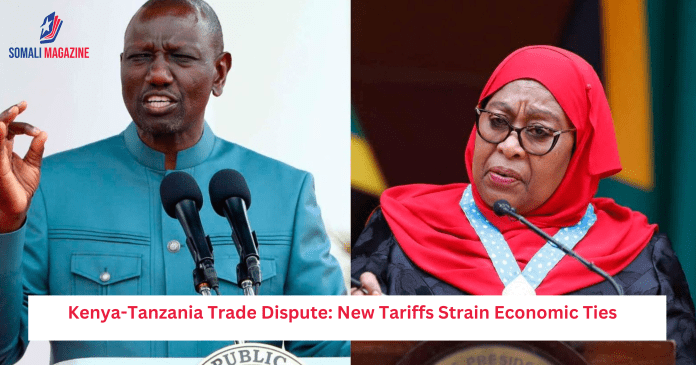Facebook Twitter Instagram Somali Magazine - People's Magazine
Kenyan manufacturers face losses as Tanzania imposes new taxes on key exports, raising concerns over EAC trade agreements
Trade relations between Kenya and Tanzania have been facing challenges due to new tariff barriers imposed by the Tanzanian government. These taxes have negatively impacted Kenyan exports to Tanzania, reducing revenue and straining diplomatic ties between the two neighboring nations.
Decline in Kenyan Exports to Tanzania
Kenyan manufacturers have raised concerns over what they call “discriminatory taxes” introduced by Tanzanian authorities. These new tariffs contributed to a KSh 4.2 billion drop in exports to Tanzania in 2023. This marks the first significant decline in eight years, except for the disruptions caused by the COVID-19 pandemic in 2020.
Tanzania’s New Tax Measures
Tanzania has imposed several taxes on Kenyan products, making them more expensive compared to locally produced goods. Some of the notable levies include:
- A sugar levy of TSh 1,000 (KSh 48.74) per kilogramme on Kenyan confectioneries such as chocolates, cookies, and candies. Tanzanian-made products are exempt from this tax.
- Dairy products from Kenya, such as yoghurt, cheese, ice cream, and butter, also face a TSh 1,000 (KSh 48.74) tax per kilogramme or litre. In contrast, similar Tanzanian products are taxed at only TSh 50 (KSh 2.44).
- A 25% excise tax on hatching eggs imported from Kenya, which contradicts the East African Community (EAC) Customs Union agreement.
These trade restrictions have led to increased prices for Kenyan goods in Tanzania, making them less competitive in the market.
Violation of EAC Trade Protocol
The East African Community (EAC) Customs Union Protocol, signed in 2005, was meant to establish free trade among member states with no internal duties on goods and services. It allows for the free movement of money, labor, and goods across member countries. However, Tanzania’s new taxes on Kenyan imports go against this agreement and create trade barriers that hurt businesses on both sides.
Impact on Businesses and Economic Growth
According to the Kenya National Bureau of Statistics, Kenya’s exports to Tanzania dropped by 7.36%, from KSh 55.96 billion in 2023 to KSh 51.84 billion in 2024. This decline is attributed to the increased cost of Kenyan goods due to the new taxes.
Kenyan manufacturers have expressed frustration over the situation. Some companies, particularly those in the steel and cement industries, have warned that these tariffs could force them to shut down or relocate their operations to Tanzania, where it may be cheaper to produce and sell goods.
Manufacturers Consider Moving to Tanzania
The Kenya Association of Manufacturers (KAM) has indicated that some businesses are contemplating shifting their production to Tanzania and Uganda to escape high taxes in Kenya. KAM’s Chief Operating Officer, Tobias Alando, pointed out that producing goods in these neighboring countries has become more cost-effective due to the tax policies.
Conclusion
The ongoing trade dispute between Kenya and Tanzania threatens economic cooperation between the two countries. While both nations stand to benefit from free trade within the EAC, Tanzania’s introduction of new tariffs has created obstacles that are hurting Kenyan businesses. Resolving these trade barriers through diplomatic discussions will be crucial to restoring trade stability and fostering economic growth in the region.

